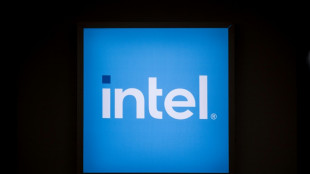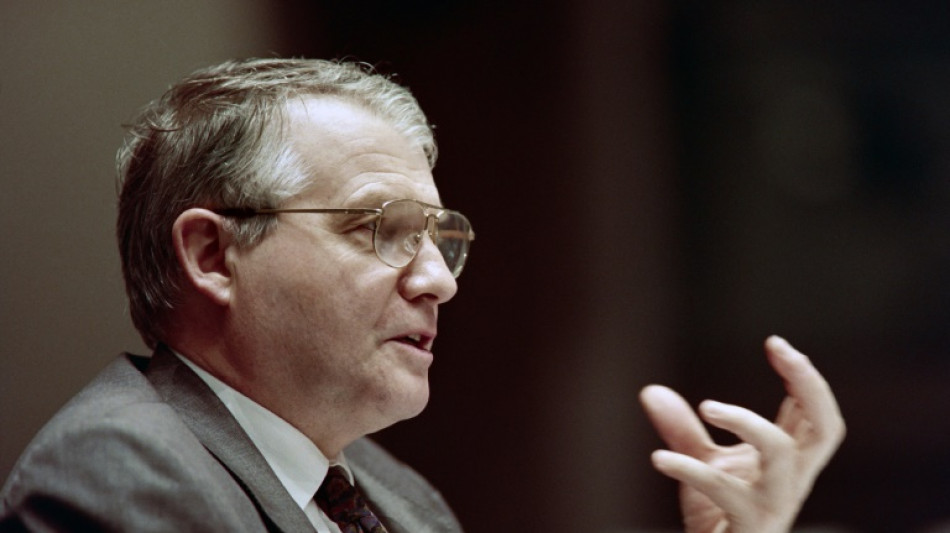
-
 South Korea's Ryu and Japan's Saigo share LPGA Chevron lead
South Korea's Ryu and Japan's Saigo share LPGA Chevron lead
-
Canada leaders make closing pitches in campaign upended by Trump

-
 De Bruyne's Man City exit 'so difficult' for Guardiola
De Bruyne's Man City exit 'so difficult' for Guardiola
-
'No regrets' for Amorim over Man Utd move

-
 Lyon and Strasbourg win to close in on Europe, Montpellier relegated from Ligue 1
Lyon and Strasbourg win to close in on Europe, Montpellier relegated from Ligue 1
-
Toulouse thrash Castres as Top 14 pursuers stumble

-
 Djokovic crashes to nervous Arnaldi in Madrid opener, Swiatek advances
Djokovic crashes to nervous Arnaldi in Madrid opener, Swiatek advances
-
Olympic champs Russell, Davis-Woodhall win at Drake Relays

-
 Browns end Sanders long draft slide
Browns end Sanders long draft slide
-
Cavs crush Heat, on brink of NBA playoff sweep

-
 Fire rages after major blast at Iran port kills 8, injures hundreds
Fire rages after major blast at Iran port kills 8, injures hundreds
-
Kiwi Beamish wins Penn Relays 1,500m crown with late kick

-
 Mbappe on Real Madrid bench for Clasico Copa del Rey final
Mbappe on Real Madrid bench for Clasico Copa del Rey final
-
England survive France fightback to seal Women's 6 Nations slam

-
 Palace sweep past Villa to reach FA Cup final
Palace sweep past Villa to reach FA Cup final
-
CAF appoint Moroccan Lekjaa first vice-president

-
 Major blast at Iran port kills 5, injures hundreds
Major blast at Iran port kills 5, injures hundreds
-
Rodgers vows to stay with Celtic after fourth successive Scottish title

-
 Ipswich relegated as Newcastle, Chelsea boost top five bids
Ipswich relegated as Newcastle, Chelsea boost top five bids
-
Canada leaders make final pitches in campaign upended by Trump

-
 Mullins -- Ireland's national training treasure
Mullins -- Ireland's national training treasure
-
US, Iran say progress in 'positive' nuclear talks

-
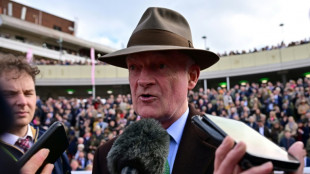 Mullins emulates O'Brien with second successive trainer's title
Mullins emulates O'Brien with second successive trainer's title
-
Ipswich relegated after one season in Premier League

-
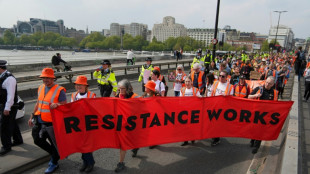 Just Stop Oil activist group holds final march
Just Stop Oil activist group holds final march
-
Djokovic crashes to nervous Arnaldi in Madrid opener
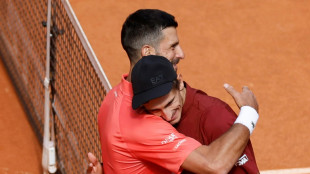
-
 Syria's Kurds demand 'democratic decentralised' Syria
Syria's Kurds demand 'democratic decentralised' Syria
-
Leverkusen win to delay Bayern and Kane's title party

-
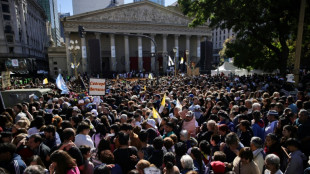 Buenos Aires farewells native pontiff with tears and calls to action
Buenos Aires farewells native pontiff with tears and calls to action
-
Turkey's opposition says Erdogan's canal plan behind latest arrests

-
 Maresca hails 'nasty' Chelsea as top five bid stays alive
Maresca hails 'nasty' Chelsea as top five bid stays alive
-
Trump raises Putin doubts after Zelensky talks at pope's funeral

-
 Major blast at Iran port kills 4, injures hundreds
Major blast at Iran port kills 4, injures hundreds
-
Napoleon's sword to be sold at auction in Paris

-
 Iran, US discuss nuclear deal in third round of talks
Iran, US discuss nuclear deal in third round of talks
-
Buenos Aires farewells native pontiff with call to action

-
 Warholm sets hurdles world record at Diamond League, Holloway shocked
Warholm sets hurdles world record at Diamond League, Holloway shocked
-
US students 'race' sperm in reproductive health stunt

-
 Wikileaks founder Assange joins crowds for pope funeral
Wikileaks founder Assange joins crowds for pope funeral
-
Leader Marc Marquez claims Spanish MotoGP sprint victory

-
 Celtic win fourth successive Scottish Premiership title
Celtic win fourth successive Scottish Premiership title
-
Jackson ends drought as Chelsea boost top five push

-
 Warholm sets 300m hurdles world record in Diamond League opener
Warholm sets 300m hurdles world record in Diamond League opener
-
Major blast at south Iran port kills 4, injures hundreds

-
 Russia says retook Kursk from Ukraine with North Korean help
Russia says retook Kursk from Ukraine with North Korean help
-
Francis laid to rest as 400,000 mourn pope 'with an open heart'

-
 Trump, Zelensky meet on sidelines of pope's funeral
Trump, Zelensky meet on sidelines of pope's funeral
-
'Shared loss': Filipino Catholics bid Pope Francis farewell

-
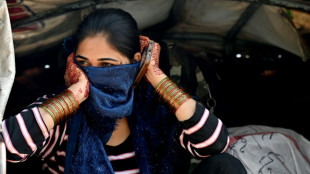 Families unable to reunite as India-Pakistan border slams shut
Families unable to reunite as India-Pakistan border slams shut
-
Major blast at south Iran port injures hundreds


Luc Montagnier: HIV discoverer who ended a pariah
French researcher Luc Montagnier, who has died at 89, shared the Nobel medicine prize for his vital early discoveries on AIDS, but was later dismissed by the scientific community for his increasingly outlandish theories, notably on Covid-19.
Montagnier and Francoise Barre-Sinoussi shared the Nobel in 2008 for their work at the Pasteur Institute in Paris in isolating the human immunodeficiency virus (HIV).
Their achievement sped the way to HIV tests and antiretroviral drugs that keep the deadly pathogen at bay.
- Bitter rivalry -
AIDS -- acquired immune deficiency syndrome -- first came to public notice in 1981, when US doctors noted an unusual cluster of deaths among young gay men in California and New York.
Montagnier had a bitter rivalry with US scientist Robert Gallo in his ground-breaking work in identifying HIV at the virology department he created in Paris in 1972.
Both are co-credited with discovering that HIV causes AIDS, and their rival claims led for several years to a legal and even diplomatic dispute between France and the United States.
Montagnier's work started in January 1983, when tissue samples arrived at the Pasteur Institute from a patient with a disease that mysteriously wrecked the immune system.
He later recalled the "sense of isolation" as the team battled to make this vital connection.
"The results we had were very good but they were not accepted by the rest of the scientific community for at least another year, until Robert Gallo confirmed our results in the US," he said.
The Nobel jury made no mention of Gallo in its citation.
In 1986 Montagnier shared the Lasker Award -- the US equivalent of the Nobel -- with Gallo and Myron Essex.
In 2011, to mark 30 years since the appearance of AIDS, Montagnier warned of the spiralling costs of treating the 33 million then stricken with HIV.
"Treatment cuts transmission, that's clear, but it doesn't eradicate it, and we can't treat all the millions of people," he told AFP.
- Controversial ideas -
Montagnier was born on August 8, 1932 at Chabris in the Indre region of central France.
After heading Pasteur's AIDS department from 1991 to 1997, and then teaching at Queens College in New York, Montagnier gradually drifted to the scientific fringes, stirring controversy after controversy.
He repeatedly suggested that autism is caused by infection and set up much-criticised experiments to prove it, claiming antibiotics could cure the condition.
He stunned many of his peers when he talked of the purported ability of water to retain a memory of substances.
And he believed that anyone with a good immune system could fight off HIV with the right diet.
Montagnier supported theories that DNA left an electromagnetic trace in water that could be used to diagnose AIDS and Lyme's Disease, and championed the therapeutic qualities of fermented papaya for Parkinson's Disease.
- 'Slow scientific shipwreck' -
He repeatedly took up positions against vaccines, earning a stinging reprimand in 2017 from 106 members of the Academies of Sciences and Medicines.
The French daily Le Figaro described his journey from leading researcher to crank as a "slow scientific shipwreck".
During the Covid pandemic he stood out again, stating that the SARS-CoV-2 virus was laboratory-made and that vaccines were responsible for the appearance of variants.
These theories, rejected by virologists and epidemiologists, made him even more into a pariah among his peers, but a hero to French anti-vaxxers.
O.Johnson--AMWN

